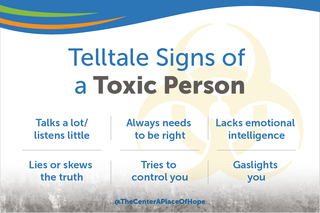Confidence
Break Free from the Trap of Toxic People
How to recognize and avoid toxic people.
Posted November 16, 2021 Reviewed by Abigail Fagan
Key points
- A toxic personality is difficult to define, but it may involve gaslighting, deflecting blame and responsibility, and preying on others' fears.
- To recognize if someone is toxic, think about if you feel uncomfortable, drained, or confused after spending time with them.
- Toxic traits are often rooted in past traumatic experiences or underlying mental health challenges.
Let’s discuss an issue to which many of us can relate — how to deal with toxic people. They pose huge problems in nearly every social and professional setting. But how do you spot the toxic people in your life, and how do you effectively deal with them?
Toxic people can not only cause us tremendous grief and worry, but they can also impact the way we behave, creating undesired toxicity in our own behaviors. Let’s understand how we can avoid or minimize their effects on our lives, and make sure we do not fall prey to their behavior.

What Does a “Toxic Person” Mean?
Defining what a “toxic person” is can be a moving target, precisely because of how a toxic person acts:
- A toxic person is deft at deflecting blame or responsibility.
- A toxic person can prey on both the goodwill or fear of others.
- A toxic person is adept at “gaslighting,” making someone else feel they are dysfunctional.
It is important to be able to define what toxic means. Because to deal effectively with a negative relationship, it is helpful to gain the confidence to call it what it is — toxic.
But we must be mindful that it can become easy to attach judgment to an individual as a “toxic person” simply because they exhibit these traits. We must understand that toxic traits are often rooted in past trauma or underlying mental health challenges that cry out for treatment (not condemnation).
That doesn’t mean we must resign ourselves to tolerate toxic people, merely to understand they are often there because of their own internal struggles.
Recognizing the Effects of Toxic People on Your Life
Perhaps the easiest way to recognize whether a toxic person is impacting your life is to note physical reactions to the individual.
- Are you physically or emotionally drained after spending time together?
- Do you feel discomfort knowing you will be interacting with the person?
- After interacting with them, do you feel reduced confidence in yourself or enjoyment in your life?
- Do you feel confused about your beliefs or boundaries after interacting with them?
- Are you frustrated that your needs, thoughts, and feelings don’t matter?
There is good news. You get to choose healthy, fulfilling, mutually rewarding, and uplifting relationships. If you are involved in a toxic relationship, you can free yourself from the toxic effects of that relationship.
Why Toxic People Are the Way They Are
Understanding “why” a person is toxic can be both challenging, and a slippery slope. To know why makes us believe that we can “fix” something. Toxic people want you to feel as though you can fix them. They want you to feel sorry for them. But you wanting to fix them can only add fuel to their fire. Solving one crisis inevitably leads to another.
The truth is toxic people thrive on their behavior. It often runs in their family and is deeply ingrained in them. They often believe they derive benefit from their behavior, and that they are solving things or helping people who need to be helped. A toxic person will frequently need to win at all costs.
How to Break Free From the Trap of Toxic People
Staying in a toxic relationship can be utterly debilitating. Similar to an abusive relationship, the toxic person is deft at pulling back, consoling, and showing contrition when necessary. But their long-term activity doesn’t change. Meanwhile, you are left with waves of false hope, only to be pulled back in time and time again.
While the toxic person almost certainly would benefit from professional help, you may as well. It can be exhausting and traumatic to be involved in a long-term toxic relationship.
Ultimately, you need to decide whether you should hang in there or move on. While you may strive to be at peace and happy with all others, it simply may not be possible with the toxic person in their current state. Ideally, they will get the help they need, and you will be able to work on your relationship with better, more balanced energy.
Whether you stay or go depends largely on the toxic person. If it is a spouse, you will want to work hard to resolve and repair. Couples counseling, or personal therapy for both are options. While no two situations are the same, here are some questions to help guide you:
1, Does the toxic relationship involve physical or psychological abuse? If the answer is yes, you need to protect yourself. Without a serious change or intervention, that behavior is likely to continue.
2. Is the other person willing to take responsibility for their actions? Toxic people are often blind to the damage they cause. Taking responsibility and having accountability are essential to rebuilding trust and maintaining trust.
3. Is the damage so severe that your relationship will permanently be hampered?
4. Can you ever truly get along with this person again?
While these are tough questions to ask, they need to be answered. Just because a person is toxic, doesn't mean there is no hope. But they have an integral part to play in whether the relationship cannot only be salvaged, but become prosperous in the future.




